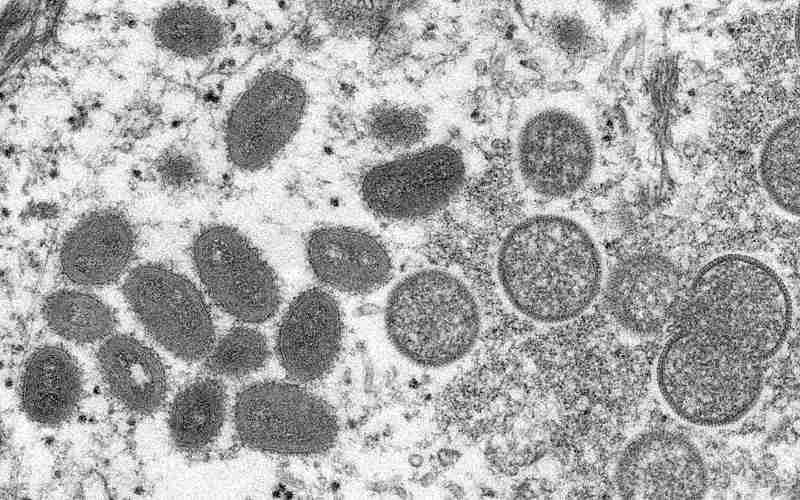
An electron microscopic (EM) image shows mature, oval-shaped monkeypox virus particles as well as crescents and spherical particles of immature virions, obtained from a clinical human skin sample associated with the 2003 prairie dog outbreak in this undated image obtained by Reuters on May 18, 2022.
12:01 JST, August 6, 2022
Sexually active Americans should consider limiting partners and avoiding sex parties to reduce the risk of contracting monkeypox until they get vaccinated, according to updated guidance from the Centers for Disease Control and Prevention released Friday.
The revisions come a day after the Biden administration declared the growing monkeypox outbreak a public health emergency and as experts, LGBT advocates and health authorities debate how to convey messages about sexual transmission of the virus.
Monkeypox is not considered a traditional sexually transmitted disease because it primarily spreads through close contact with lesions. But global data suggests skin-to-skin contact during sex is fueling the outbreak, which has resulted in more than 7,000 infections in the United States and 26,000 throughout the world. Cases that have been reviewed in detail show that infections are overwhelmingly among gay men.
Last week, the leader of the World Health Organization said men who have sex with men should consider temporarily reducing their number of sexual partners or stop adding new ones to help stanch the outbreak, setting off a debate about whether calls for sexual restraint are counterproductive and stigmatizing.
The new sexual health guidance from the CDC echoes the comments from WHO Director General Tedros Adhanom Ghebreyesus, although not as bluntly. It does not single out men who have sex with men. The CDC guidance says risk of exposure can be reduced by limiting sexual partners, avoiding spaces such as sex clubs where anonymous sexual contact with multiple partners occurs, and wearing clothes, including leather or latex, during sex as a skin-to-skin barrier.
The guidance emphasizes that behavioral changes can be temporary until a person is fully vaccinated with two doses against monkeypox. While the United States is distributing hundreds of thousands of vaccine doses in the coming weeks, there are not enough to vaccinate everyone who is eligible, and some jurisdictions are administering only one of two shots to stretch limited supplies.
“These temporary changes will help slow the spread of monkeypox until vaccine supply is adequate,” the CDC guidance says.
Before the update, the CDC had advised only people with confirmed or suspected cases of monkeypox to refrain from sexual activity.
Public health authorities generally emphasize ways to reduce risk of contracting disease during sex rather than urging people to avoid sex. Some public health officials and experts say people will make their own decisions to abstain from high-risk sexual activity when presented with information about viruses and how they spread.
Monkeypox has presented messaging challenges for public health officials because it can transmit outside of sexual activity, such as by hugging or sharing contaminated bedding, and because condoms do not offer full protection against exposure to rashes.
Some public health experts say recommending a temporary reduction in sexual activity does not amount to a call for abstinence, which is widely regarded as ineffective by disease prevention specialists.
“This is not a forever thing. It is a for-now thing and as we work to scale up biomedical interventions,” said Demetre Daskalakis, a top Biden administration official leading the monkeypox response who has expertise in HIV prevention, on a call with reporters Friday.
The CDC did not widely promote its new guidance after releasing it online Friday. A tweet and accompanying video linking to the changes did not mention the new recommendations to reduce exposure, including limiting sexual partners. Daskalakis said officials will turn to organizations with credibility in the most affected communities to help promote prevention messages.
While the CDC guidance does not mention sexual orientation or gender identity, data released by the agency Friday shows infections remain overwhelmingly among men who have sex with men.
In 358 male cases with detailed information, 94% report intimate or sexual contact with another man during the three weeks before developing symptoms.
Nearly 300 men offered additional details about their sexual activity in that three-week period: 40% reported two to four partners, 27% reported one partner, 19% reported 10 or more partners and 14% reported five to nine partners.
Monkeypox causes flu-like symptoms, including fever, swollen lymph nodes and a rash that can spread throughout the body. Doctors are observing more lesions around the genitals, mouth and anus of patients in the latest outbreak, suspected to be linked to sexual transmission.
In 291 cases with detailed symptom data, 42% of patients did not report flu-like symptoms before developing rashes, as is typically seen in monkeypox patients. In a sample with detailed information about rash locations, just under half reported them around the genitals.
The CDC data also showed that people of color are bearing the burden of monkeypox cases at levels disproportionate with their presence in the population overall.
In more than 1,000 cases with race and ethnicity reported, 41% were white, 28% were Hispanic and 26% were Black.
Cases are disproportionately affecting Black people as the outbreak grows, from 12% of cases between May 17 and July 2 to nearly a third of cases between July 3 and July 22.
Top Articles in News Services
-

Survey Shows False Election Info Perceived as True
-

Prudential Life Expected to Face Inspection over Fraud
-

Hong Kong Ex-Publisher Jimmy Lai’s Sentence Raises International Outcry as China Defends It
-

Japan’s Nikkei Stock Average Touches 58,000 as Yen, Jgbs Rally on Election Fallout (UPDATE 1)
-

Trump Names Former Federal Reserve Governor Warsh as the Next Fed Chair, Replacing Powell
JN ACCESS RANKING
-

Japan PM Takaichi’s Cabinet Resigns en Masse
-

Japan Institute to Use Domestic Commercial Optical Lattice Clock to Set Japan Standard Time
-

Israeli Ambassador to Japan Speaks about Japan’s Role in the Reconstruction of Gaza
-

Man Infected with Measles Reportedly Dined at Restaurant in Tokyo Station
-

Man Infected with Measles May Have Come in Contact with Many People in Tokyo, Went to Store, Restaurant Around When Symptoms Emerged
























